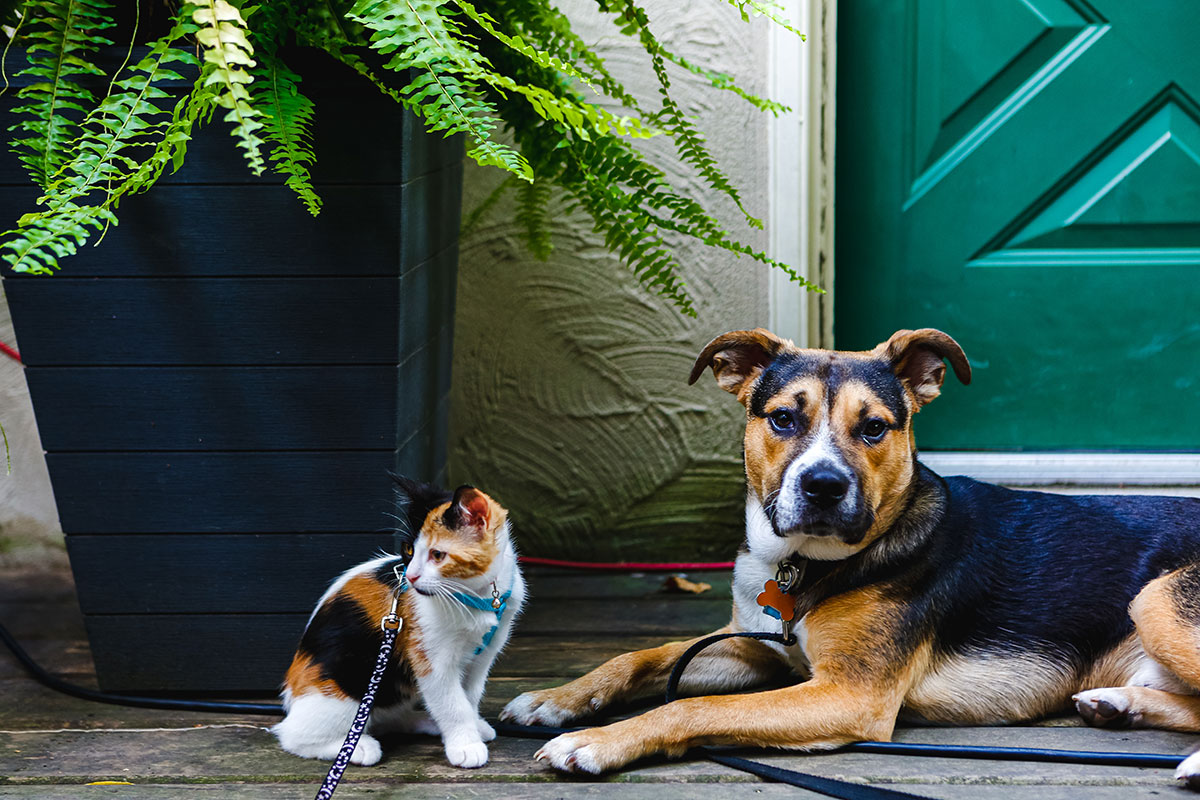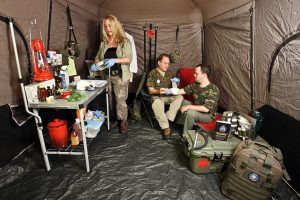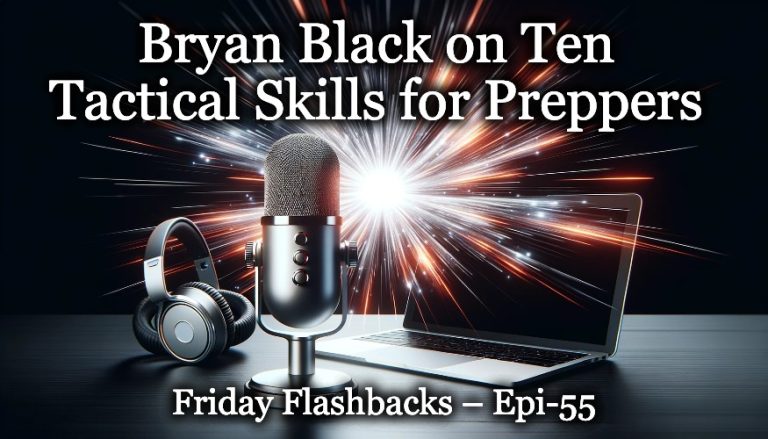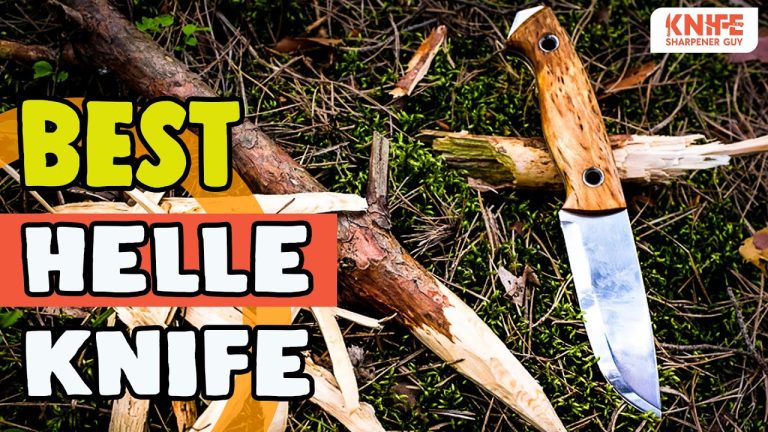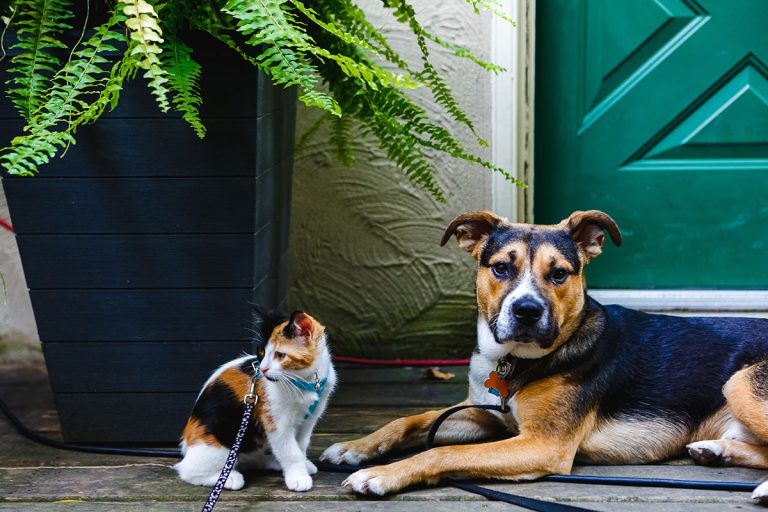5K
Let’s dig into the details of pet survival and what it would take to make sure you’re prepared to care for your pets during a crisis.
What would you do if the lights went out–for good? You’ve prepped for yourself and your family, but what about your pets? Have you stored what you need for your cataclysm cat? Your doomsday dog?
This is an important for most Americans. According to Forbes, 66% of U.S. households own a pet. Dogs are the most popular pet (65.1 million U.S. households own a dog), followed by cats (46.5 million households).
In this article we are going to look at:
- 6 reasons WHY you need your pets to survive with you,
- How the so-called experts’ advice falls short,
- What I say you need to do to protect your pep at beginner, intermediate, and advanced levels.
- What–if the worst thing happens–you must do if you must leave your pet behind. Perish the thought.
What this article will NOT cover is pet survival for animals like fish, lizards, or therapy turtles. What I will cover is primarily for cats and dogs.
6 Reasons Why You Need Your Pets
Pets are often seen as members of the family. I can’t imagine something happening to my little pup once the supply chain collapses, once the grid goes down–for good.
Which brings me to the first reason why you need your pets, and what you must do to make sure they can survive the collapse with you.
- Emotional Support and Companionship: In times of crisis, stress and anxiety levels can skyrocket. Pets, known for their ability to provide emotional comfort, can be invaluable in maintaining mental well-being after SHTF. This is especially true for individuals who live alone or are separated from family members and children. There are therapy dogs for this exact a reason.
- Alerting to Danger: Dogs have keen senses and can detect threats that humans might miss. They can alert their owners to the presence of intruders, zombies, other animals, or environmental dangers (like fires or gas leaks) long before humans become aware of them. This early warning system can be lifesaving in post-collapse scenarios.
- Hunting Assistance: Some dogs and cats have hunting instincts that can be helpful in a survival situation. Dogs can be trained to assist in hunting small game, while cats can help control rodent populations, which can be crucial in maintaining a sanitary and disease-free environment. Mice and rats, which can be a major concern in situations where traditional pest control methods are unavailable.
- Security and Protection: Dogs can offer a level of security and protection. Their presence can deter intruders and they can defend their owners in dangerous situations. Training a dog for protection can be an added advantage in ensuring safety.
- Thermal Comfort: Pets, especially larger animals like dogs, can provide warmth during cold nights, which could be crucial in situations where heating options are limited.
- Food: In a worst-case scenario, your pet can be a source of food. I mean, if you have to choose between your dog and your children… Well, little Mittens might need to be put on the BBQ. I’m kidding…. *ahem*
Expert Pet Survival Advice Falls Short
Now, if you Google “how to prep for pets” or “pet survival” you’re going to get results from the so-called experts: the Red Cross, FDA, etc.
The unfortunate thing is that most pet owners are not members of the Survive Doomsday tribe. They haven’t subscribed to my YouTube channel like you have. They haven’t joined my email list like you have. Those expert sites don’t offer advice for a long-term collapse. It’s just sad.
Take for example the advice from the Red Cross. Their top tip? “If it’s not safe for you to stay in your home during an emergency, it’s not safe for them either.” Really? No kidding!
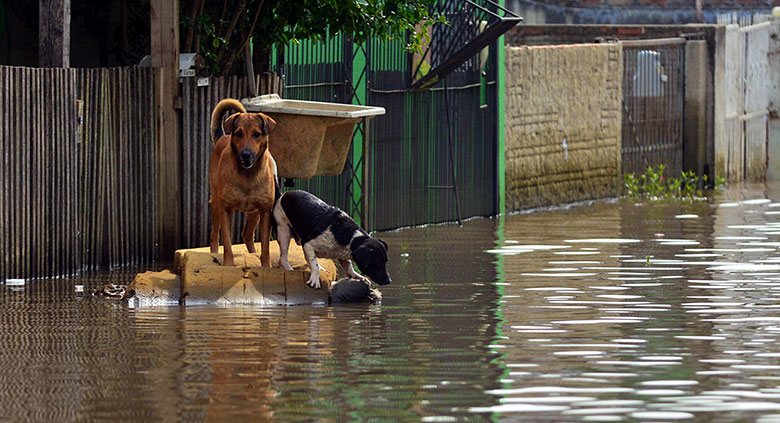
The FDA’s site isn’t much better, but they suggest stocking just a week’s worth of food and water for your pet.
One week!? What are these people doing who don’t have a week’s worth of pet food always on hand, using door dash for cat and dog meals?
These sites offer silly survival, and our apocalypse pets deserve much better than beginner advice. We’re advanced preppers, and fortunately for our furry friends, we’re going to account for them in our personal preparedness plans.
3 Levels of Pet Survival Preparedness
So, let’s get into the thick of it. I’m going to break pet prepping down into 3 levels: Beginner, Intermediate, and Advanced.
1) Beginner Level
At the beginner level, you’re essentially taking similar steps to what the “official” sites would recommend. These are first-level pet preps. Make sure you have accounted for these before advancing to the next step. Since short-term preps are meant for more common crises, it’s logical to start here and not at end-of-the-world pet preps, which we’ll get to in a moment.
Microchipping and Identification
You probably already have a collar around your pet with an ID tag. Make sure it’s clear to see as they wear over time and that you have more than one phone number on there. In a crisis, a natural disaster in particular, it’s not uncommon for pets to go missing. Assuming your pet can survive on its own for a while, and odds are it can, this is easiest and cheapest way to assure your pets gets back to you.
Fewer people get their pets microchipped, but it’s not that uncommon either. This is a scannable chip injected just under the skin by a veterinarian. It’s no more painful than a typical injection, though the needle is slightly larger. It’s fast and easy. Make sure your contact info on the chip remains up to date.
The obvious advantage to the microchip over the collar tag is that it can’t easily be removed. In some instances, it’s also safer. The collar around a pet, particularly during a chaotic even when they’re fleeing, can get caught on something, trapping the pet and/or strangling it.
Food and Water
The most important thing here is to make sure you have at least a two-week supply of pet food at all times. Think of pet food like stocking your pantry. Buy extra of the food your pet already eats and just rotate stock.
Water shouldn’t be hard either. Just make sure that you’ve accounted for your pets when determining your water needs. If you need help with that, see my article on how much water to store.
Medication and First Aid Supplies
Stock up on any regular medications. Chat with your vet about getting extra supplies for emergencies. Most shouldn’t object to his unless it’s a controlled drug of some type. You could also say you’re going on vacation and taking your pet with you, so you need another month’s supply. Then just stock that extra month and rotate stock.
You also want to either account for your pet in your own first aid kit or build a pet-specific first aid kit.
Emergency Zone – Small Dog Emergency Survival Kit – Bug Out, Emergency, Travel Kits, First Aid – Basic
- No Dog Left Behind: Get a dog emergency kit; be prepared to protect everyone in the family
- Pet Needs: Includes food, water, blanket, and other items for your dog’s physical needs
- Comfort Your Dog: Has toys to distract your dog to help put them at ease in unfamiliar environments
- Emergency Preparedness: Packed with basic supplies to get you through an emergency situation
- Emergency Zone: Supplies peace of mind through top-ranked survival kits and premium food storage
Basic pet first aid items should include:
- Antibiotic ointment
- Bandage tape and scissors
- Cotton bandage rolls
- Flea and tick prevention
- alcohol pads
- Latex gloves
- Saline solution
- Towel and washcloth
- Tweezers
- Gauze
- Antiseptic wipes
- Proper fitting muzzle
No need to try to write all of that down. In the description there will be a link to the corresponding article covering this same topic on my website where I have everything already listed out for you.
If a crisis strikes, something like a natural disaster with crazy weather, close off or eliminate unsafe nooks and crannies where frightened cats may try to hide. Bring your pets indoors as soon as you learn trouble is on the way.
2) Intermediate Level
The intermediate level of pet prepping builds upon the beginner level by looking at bug out scenarios and taking pet food storage more seriously.
The medication and first aid supplies you already stocked, you’re now going to put that into a pet bug out bag, which could just as easily be a tote, bucket, or some other container. Build a pet kit and store it in a small plastic tote or pet specific bug out bag. Maybe you will even need a pet carrier and you can just store everything inside that. Whatever you put it in, make sure it’s ready to go and everyone knows where it is. Grab and go is the goal.
In addition to the first aid equipment we discussed, you’ll add:
- Copies of registration and vaccination certificates
- Cat litter and tray, dog poop bags
- Food and water bowls
- Blankets, if easily portable and necessary
- Toys
- Leash
- Photograph of you WITH your pets in sealed plastic bags
Building your pet’s bug out bag is one thing, but you also need to practice an actual bug out. This is something most preppers don’t do. They figure they have their bug out bag—now they’re good, but you should really practice bugging out and using the gear in your kit. This is good practice, you become familiar with your gear, and everyone in your household knows the routine. This is the same for pets.
You don’t have to go out of your way to make a special bug out. You can couple a practice bug out with a trip to grandma’s house—or something. I don’t know, the point is to practice so when a crisis strikes, no one is freaking out wondering what to do, whether they grabbed everything, etc. Everyone is ready to act. Practice these evacuation drills with your pets. This helps them get used to the process and reduces panic during an actual evacuation.
When you practice this, make sure every family member gets a chance to be in charge of securing the pets. Your pet should be accustomed to riding in whatever you plan to evacuate in, and when you plan your bug out routes, plural routes because you need to identify more than one bug out location, identify—in advance—hotels along the way that accept pets, assuming you might need to stay overnight somewhere. Make a list of boarding facilities and veterinary offices that might be able to shelter animals during disasters and emergencies (and make sure to include their 24-hour telephone numbers).
Keep a list of animal-friendly places handy and call ahead for a reservation as soon as you think you might have to leave your home. The longer you wait, the less likely there will be vacancies at nearby locations.
Search for pet-friendly accommodations at sites like:
3) Advanced Level
If you’ve hung on until now, you’re about to enter advanced level pet prepping. You’re worthy of the joining the Survive Doomsday tribe, so I encourage you to subscribe to the channel. Together we will rule the post-apocalyptic world!
This level of personal pet preparedness is going to require more than just accumulating supplies. You’ll have to educate yourself, or at a minimum secure some books that will help you navigate post-collapse pet care.
You’ll want to buy a few EMP-proof paperback books for this. A medical pet care book is essential. I would recommend the military’s Veterinary Care and Management of the Military War Dog.
If you’re training a war dog, I’d also recommend the U.S. Military’s Dog Training Handbook.
In fact, anyone planning to rely on a hunting dog, security dog, or service dog as part of their long-term preparedness should just assume you’ll need this advanced level of pet preparation.
Reinforce basic obedience commands. In a chaotic world, a pet that listens and responds quickly to commands is safer. Train your pets to adapt to new environments. This might include acclimatization to different sounds, smells, and sights they might encounter in a post-collapse world. Train pets to be cautious around wildlife. In a post-collapse world, interactions with unfamiliar animals could increase.
Invest time in learning basic veterinary care – wound dressing, recognizing common illnesses, administering medication, and understanding dietary needs. Resources can include veterinary books, online courses, and workshops.
Know hacks with natural materials. For example, diatomaceous earth can be used for flea control.
At this level, food is the only other big issue to address. You could stock mountains upon mountains of pet food in the manner I already outlined, but that can be expensive and tedious. Setting up a system of food production for your pets is a better idea. Fortunately, this is easier than you might think.
Let’s start by going back in time for lessons from the past, as the post-apocalyptic future is going to look a lot like the past. Early Romans were feeding their farm dogs barley bread soaked in milk. They fed their war dogs raw meat.
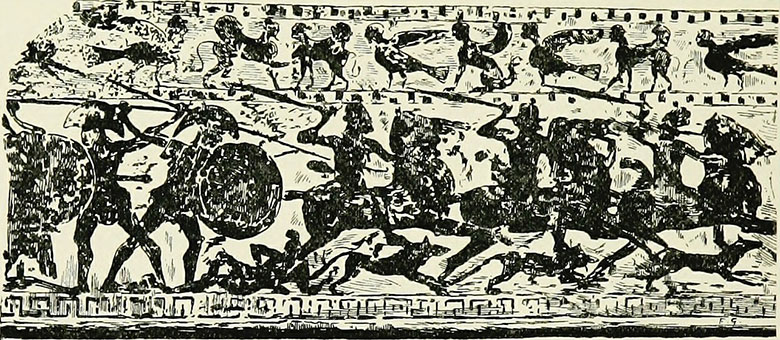
That was over 2,000 years ago. Fast forward to the Middle Ages. European royalty would treat their hunting hounds like royal family. Kennel cooks made large vats of dog stews containing grains, vegetables, and some meat.

Commoners’ dogs, on the other hand, were fed meager diets of breadcrumbs, bare bones, potatoes, and whatever the dog could scrounge on its own. Live with a peasant, eat like a peasant.
The modern era of pet food has only been around since the 1850s, invented when a savvy businessman saw sailors throwing spoiled hardtack off the ship onto the docks below for the dogs to eat. This gave way to the modern dog biscuit.
These are largely carbohydrate-heavy foods, however. In urban settings, where horses were used regularly, horse meat was widely used for dog food. A horse drops in the street, slice it up or the dogs.
The growing trends today are the raw food diet and freeze-dried food diet. Conveniently, both trends can lend themselves well to post-collapse scenarios. Raw food means no cooking, and no need to use valuable fuel. Freeze-dried foods if you have a personal Harvest Right freeze-dryer—perfect.
The unfortunate truth, post-doomsday, is that many will be living like peasants. In a total collapse, we’ll be lucky enough just to survive, never mind survive with our pets.
That means our cats and dogs will be eating scraps. While not a high-end modern dog food, that’s not bad, and it’s the strategy used for centuries to feed domesticated pets.
Yes, you can raise rabbits and chickens for dog meat. You can grow carrots and green beans to mix into their food, but… you’re probably gonna want to save that for yourself and your human loved ones.
That might not be the case for you, however. You might live on a hobby farm where herding dogs play an outsized role. Pets of this type are working pets and they become survival tools onto themselves, and they warrant special consideration when planning out food sources. Account for them much like you would a family member.
If You Must Leave Pets Behind
Now, what happens if the unthinkable happens. You have to evacuate and—for whatever reasons—you can’t evacuate with your pets. Let’s look at how to prep for pets left behind.
Your initial reaction might be—never! I’ll never leave my pet behind. Never say never. Plan for the unexpected. A hurricane could be approaching, and Mittens has gone missing.
Maybe you solely planned for a bug-in situation, never expecting the need to bug out, and suddenly there you are, in the center of the danger zone and you have to evacuate to the Superdome. I don’t know, but it could happen, so plan for it!
Step 1 – Get a Rescue Alert Sticker
The first course of action is to get a rescue alert sticker. These are cheap and readily available on Amazon. They are easy-to-use stickers that let people know pets are inside your home.
Sale
Vinyl Friend Pet Alert Stickers – FIRE Safety Alert and Rescue – Save Your Pets encase of Emergency or Danger Pets in Home for Windows, Doors Sign (10 PACK, DISPLAY)
- 10 PACK – 4 Reusable Static Cling decals, 3 key tags with 3 key rings, 3 wallet cards. STICKS FRONT AND BACK – MUSTS CLEAN WINDOWS / SURFACE BEFORE APPLYING
- RE-USE – REMOVE – REAPPLY – DECALS STICK ON FRONT OR BACK – Apply to the inside or outside of a window + WATERPROOF . Made with material you can trust in USA.
- KEY TAG and KEY RINGS – Set of 3, one for you, your spouse and a spare just in case! Key tag is DOUBLE SIDED
- WALLEY CARD – SUPER THICK double sided printed and easy to write info. Made from a premium stock. CREDIT CARD size fits right into your wallet or purse pouches. Please note: we recommend permanent maker to write on these cards.
- BEST VALUE and MADE IN USA
Make sure it is visible to rescue workers, and that it includes the types and number of pets in your home as well as the name and number of your veterinarian. If you must evacuate with your pets, and if time allows, write “EVACUATED” across the stickers.
Step 2 – Consider a GPS Tracker
Tractive GPS Tracker for Dogs – Waterproof, GPS Location & Smart Pet Activity Tracker, Unlimited Range, Works with Any Collar (White)
- REAL-TIME GPS TRACKING WITH UNLIMITED RANGE: Track your dog’s live location nationwide with updates every 2-3 seconds—up to 30x faster than competitors who only update once per minute. Perfect for keeping an eye on your dog no matter where they roam.
- VIRTUAL FENCES & LOCATION HISTORY: Set up safe zones and receive alerts when your dog leaves the area. Activate live tracking immediately to recover your dog, and review their location history to see where they’ve been.
- HEALTH & ACTIVITY MONITORING: Monitor your dog’s daily health, sleep patterns, and activity levels through the Tractive app, available on iOS and Android, so you can keep them in optimal shape.
- LIGHTWEIGHT, WATERPROOF DESIGN & LONG-LASTING BATTERY: This lightweight tracker is waterproof and rugged enough for outdoor adventures. The battery lasts up to 10 days, with extended life using Power Saving Zones.
- SUBSCRIPTION REQUIRED: The subscription covers all the costs of the integrated SIM card and data, starting from $5/month (varies depending on subscription plan). Try it risk-free with our 30-day money-back guarantee. Need help? Our support team is just a click away.
The second thing is to consider a GPS tracker. GPS trackers can be invaluable tool for locating your pet, and they’re less expensive than you might think. They will allow you to track down your pet either before—or after—danger has passed.
Step 3: Choose “Designated Caregivers”
The other tip—assuming you have your pet with you and can’t bug out with it—is to identify a designated caregiver, someone who lives close to your residence or along your bug out route who can care for your pet when you cannot. This person should be generally home during the day while you are at work or has easy access to your home. A set of keys should be given to this trusted individual. This may work well with neighbors who have pets of their own—you may even swap responsibilities, that way you have an agreed upon responsibility to one another, which can offer greater commitment from the other party.
Be sure to discuss your expectations, so he or she understands the responsibility of caring for your pet.
Here’s another tip on when you must leave pets behind when flooding is a risk. Make sure the highest levels of your home are accessible to your pet. If you have a second floor or accessible attic, make sure your pet can access those levels. Leave food and water on countertops or high on shelves, or both.
And during ANY natural disaster—DO NOT tether your pet. They would be unable to flee if the situation worsened.
Leave a note behind giving details about your pet and your contact information.







